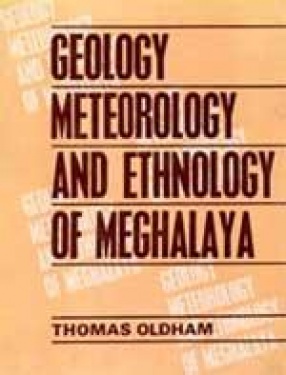As its title indicates, the book contains a brief but significant account of the geological structure, meteorology and ethnology of Khasi Hills in the North Eastern Frontier of India during the middle of Nineteeth Century when this region was annexed by the British power and made administratively a part of Bengal. Assam had already acquired the distinction of possessing unlimited mineral wealth. During 1851, the author who was holding the post of the Superintendent of the Geiological Survey of India, with a view of examine the mode of occurrence, extent and character of its mineral wealth particularly the Iron oreas which had for many ages been worked these hills. He visited some of the principal weashings for the iron ore, traced out some of the coal bads and examined and reported on the coal pits at Lakadong in the Jyntea (Jantia) hills. He continued his efforts to make the geological researches into the physical structure of these hill skl during 1952 as well. He found that a very large area in the Khasi hills was composed of slaty and gneissose rocks presenting for the most part a highly crystailine character and traversed throughout their entire extent by numerous veins of granitye and here there by dykes and bursts of greestone. The second part of the book recordstheauthor’s observations about the aconomical geology of the Khasi Hills. Among its minderal products, the most important are time, cost and iron ore. The working of local mines was given on a perpetual lease, by Soobah singh, the then Raja of chera Poonjee, to the british government on a nominal royalty of Rs. 1 for every 100 maunds according to an Agreement signed by the Rajah with British power on 20th April, 1840. The book also describes the growth and cultivation of agricultural crops like potato, pine-apples and oranges in the Khasi hills from where they were expected to Calcutta markets. At the end there are three Appendices. They recordkl the elevation above the sea of various localities in the Chera Poonjee which has a peculiar positon on account of its situation on thekl summit of a highly elevated ridge which rises krapidly and almost perpendicularly from the great expanse of the plains of Bengal Lastly in the third appendix the author has described the language and ethnology of the Khasis. He has described the peculiar position of the country inhabited by Khasis, their connectin on the one side with the Bengali groups that dwell on the plains of Sythet, Tipparah (Tripura) and Mymensing and on the other side with the Assamese and several other factors which continue to render the study of their language, their habits and customs as one of great interest. The book is undoubtedly one of the earliest authentic reference tools and a valuable source book of immense research utility for those who are engaged in the research on geography geology, methropology, ethnology and meteorology of the North Eastern Front of India.
Utilization of Whey
$13.50
$15.00





There are no reviews yet.